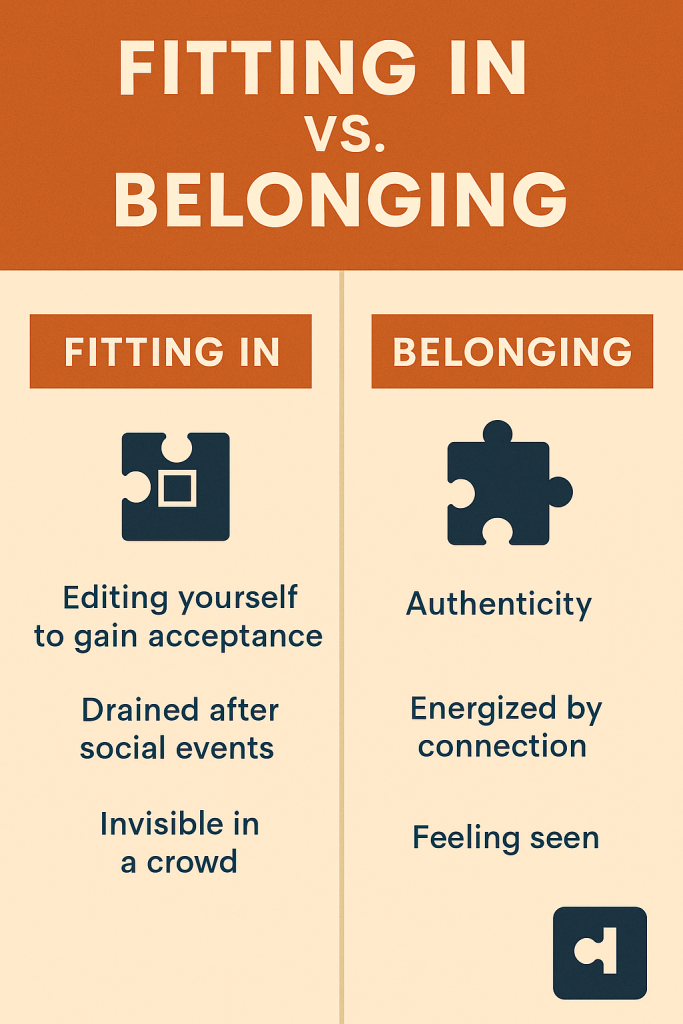Introduction
Have you ever walked into a room, smiled, nodded at the right times, and still felt like an imposter in your own skin? That’s the difference between fitting in and belonging. Fitting in is like putting on a costume—it hides your truth to gain approval. Belonging, on the other hand, feels like slipping into your favorite sweater: comfortable, freeing, and fully you.
The tricky part? Society often rewards fitting in. From childhood classrooms to corporate offices, the message is clear: don’t stand out too much. But spiritually—and psychically—this constant self-editing dulls your natural energy. You’re not meant to camouflage; you’re meant to radiate.
Psychics often remind clients that belonging isn’t just social—it’s energetic. It’s about aligning your vibration with people, places, and purposes that resonate with your true self. When you belong, synchronicities increase, intuition sharpens, and even your health improves.
This article explores why belonging matters more than fitting in, how science and spirituality both affirm its importance, and how psychic insight can guide you toward your authentic tribe.
Section 1: The Psychology of Belonging
Humans are wired for connection. Psychologists like Abraham Maslow recognized belonging as a core human need, right alongside food and safety. But belonging isn’t just “nice to have.” It’s essential for survival and well-being.
The Harvard Study of Adult Development, the longest-running study of its kind, found that strong relationships are the single biggest predictor of happiness and longevity (Harvard Gazette). Not wealth, not status—relationships. When people feel like they belong, they thrive physically, emotionally, and spiritually.
Psychologically, fitting in demands performance. You adjust your words, interests, and even appearance to match the group. It’s exhausting because it creates cognitive dissonance—you’re one person inside and another outside. Belonging, however, allows authenticity. Your nervous system relaxes, your creativity flows, and your stress decreases.
Psychics often observe this difference energetically. Clients who constantly fit in but never belong usually carry a “fractured aura”—scattered energy that shows they’re living against their truth. In contrast, people who belong radiate coherence, like a symphony playing in tune.
So belonging isn’t just about comfort—it’s about health, happiness, and alignment.
Section 2: The Energetics of Fitting In vs. Belonging

From a psychic perspective, fitting in and belonging aren’t just social behaviors—they’re energetic states.
Fitting in feels like squeezing yourself into a mold. You adjust your speech, dim your quirks, or even fake enthusiasm to match the crowd. Energetically, this is like lowering your frequency to meet others where they are, even if it costs you authenticity. Over time, it leads to exhaustion, anxiety, and a sense of being invisible.
Belonging, however, is resonance. Think of a tuning fork. When you strike one, another fork at the same frequency will begin to hum—even across the room. Belonging works the same way. When you live in your authentic energy, the right people and places naturally vibrate in harmony with you.
Psychics often describe this as the difference between a “fractured aura” and a “coherent aura.” People forcing themselves to fit in carry scattered energy fields, almost like static. In contrast, people who belong radiate balance, clarity, and grounded confidence.
One PsychicOz client once shared how she constantly reshaped herself at work—laughing at jokes she didn’t find funny, staying late even when exhausted, and hiding her spiritual interests. A psychic pointed out the energetic misalignment. Within months of seeking environments where she could be her full self, she reported not only new friends, but also fewer migraines and better sleep.
When energy flows authentically, life responds. That’s the power of belonging.
Section 3: Signs You’re Only Fitting In
Not sure whether you belong or you’re just fitting in? Here are common signs psychics and psychologists alike point out:
1. You edit yourself constantly.
You pause before speaking, worried about saying the “wrong” thing. Instead of expressing your truth, you filter every thought.
2. Social events leave you drained.
If you come home from gatherings exhausted rather than energized, chances are you were performing instead of belonging.
3. You overthink your presence.
Do they like me? Did I sound stupid? Was I too quiet? Fitting in often comes with an internal critic on repeat.
4. You feel invisible even in a crowd.
Surrounded by people, yet lonely. This is a classic sign of fitting in without belonging.
5. You laugh when it isn’t funny.
Pretending to find joy in things that don’t resonate is a giveaway that you’re shrinking to match the group.
Take note: these signs don’t mean something is “wrong” with you. They simply signal that you’re in an environment that doesn’t match your authentic vibration. As one PsychicOz advisor put it: “It’s not that you’re too much—it’s that the room is too small.”
Section 4: The Power of True Belonging
When you stop twisting yourself into someone else’s mold and finally land in spaces where you truly belong, everything shifts. Belonging nurtures your well-being at every level—emotional, physical, and spiritual.
Research backs this up. The Mayo Clinic highlights that strong friendships and social support lower stress, reduce health risks, and boost overall quality of life (Mayo Clinic). Belonging, then, is not just a “feel-good” idea—it’s medicine for your body and soul.
Belonging also sparks creativity. When you feel safe and accepted, your brain relaxes, freeing energy to innovate, dream, and explore. Compare this to the mental drain of fitting in, where most of your energy goes into self-monitoring.
On an energetic level, true belonging feels expansive. Clients often tell psychics they notice synchronicities—meeting the right mentor “by accident” or stumbling into a community that feels like family. This is no coincidence. When your vibration is in harmony with belonging, the universe responds by aligning opportunities and people around you.
Take the example of a woman who joined a local meditation circle after years of feeling isolated. Within weeks, she felt lighter and happier. One evening she told her psychic, “I finally feel like I’ve found my people. It’s like my soul can exhale.” That is the power of belonging—it breathes life back into your spirit.
Section 5: Psychic Guidance for Belonging
So where do psychics come into the picture? Belonging isn’t always easy to locate, especially if you’ve been conditioned to prioritize fitting in. That’s where psychic guidance becomes invaluable.
Astrology, for instance, can reveal areas of life where your soul feels most at home. Your Moon sign speaks to emotional comfort zones, while your North Node points to your soul’s growth path. If your chart shows a strong water influence, you may feel most at home in nurturing, emotionally expressive communities.
Tarot also shines light on belonging. Pulling The Star often symbolizes authenticity and hope—a card that reminds you belonging happens when you dare to shine without masks. The Hierophant, meanwhile, might suggest spiritual groups or traditions where your energy resonates.
Clairvoyant or empathic psychics can sense energetic mismatches. One PsychicOz client called, exhausted from family drama. Her advisor tuned in and said: “You’ve been trying to belong where your energy isn’t received. Your real soul family is waiting outside this circle.” Months later, the caller found healing and acceptance in a group of spiritual creatives.
Psychic guidance doesn’t replace the inner work of self-acceptance, but it provides a compass. By clarifying where your energy feels forced versus where it flows, psychics help you find not just community, but your soul’s true home.
Section 6: Steps to Shift into Belonging
Moving from fitting in to true belonging takes courage—but it’s possible. Here are some steps psychics and psychologists often suggest:
1. Journal Your Energy Patterns
Keep track of when you feel energized and when you feel drained. Notice which people or environments light you up and which shrink you.
2. Practice Saying No
Every “yes” that betrays your true self is an energetic withdrawal. Start small: decline an invitation that doesn’t resonate.
3. Find Authentic Spaces
Whether it’s a spiritual circle, an online community, or a hobby group, seek spaces that value authenticity.
4. Seek Psychic Guidance
A reading can highlight where your energy feels misaligned and point you toward your soul tribe. Psychics often confirm what your intuition already whispers: you deserve more than just fitting in.
5. Celebrate Small Belonging Moments
Notice when someone laughs at your real joke, when you speak your truth without fear, or when you meet someone who “just gets it.” These are breadcrumbs leading you home.
One caller shared with PsychicOz that she started journaling about her energy daily. Within a month, she realized her friendships were one-sided. With her psychic’s encouragement, she stepped back from those ties—and almost immediately, she attracted a new circle that celebrated her true self.
Section 7: Modern Belonging Challenges
Belonging has never been more important—and never more complicated.
Social Media Pressure
Platforms encourage fitting in through likes, filters, and follower counts. Belonging is measured in numbers, not depth. The result? Many people feel lonelier despite being “connected.”
Remote Work Isolation
Working from home saves time but can reduce casual bonding. Without face-to-face interactions, employees may feel detached, like they’re performing rather than belonging.
Cultural Overload
We live in a world of curated identities. People perform versions of themselves—online, at work, even with friends. True belonging gets lost in the noise.
The Greater Good Science Center at UC Berkeley emphasizes that belonging isn’t about numbers, but about depth—feeling seen and accepted for who you really are (Greater Good Berkeley).
A striking example: A college student once shared she had over 100,000 social media followers, yet no one she felt comfortable calling at 2 a.m. That’s fitting in, not belonging.
Psychics hear these stories daily—clients surrounded by people, yet starved for true connection. And time after time, readings remind them: belonging is not about the crowd, but about resonance.
Section 8: Healing Through Belonging
Belonging isn’t just a “feel-good” concept—it has measurable healing power. People who feel genuinely connected often experience fewer symptoms of anxiety, depression, and even chronic illness. When your nervous system feels safe in community, your body can relax and repair itself.
The Mayo Clinic notes that people with strong social support tend to have healthier immune systems, reduced risk of major health problems, and greater longevity (Mayo Clinic). Belonging literally heals the body.
Spiritually, belonging amplifies your energy field. When you’re surrounded by people who see and accept you, your vibration rises. This makes it easier to attract synchronicities, manifest goals, and hear your own intuition clearly.
A PsychicOz advisor once told a client who had just left a toxic workplace: “Now that you’ve stepped out of misalignment, watch for the signs.” Within weeks, the client reported running into a mentor she’d been hoping to meet and joining a creative group that became her new support system. Belonging opened the doorway for healing and growth.
Belonging isn’t just about relationships—it’s medicine for both the soul and the body.
Section 9: Belonging to Yourself
True belonging begins within. You can’t fully connect with others until you accept the person you are when no one else is watching.
Psychics often see this in readings: clients long for a partner, a community, or a soul family—but the block is their own self-rejection. As one advisor put it, “How can you belong anywhere if you don’t yet belong to yourself?”
Belonging to yourself means:
Accepting your quirks without apology.
Honoring your emotions instead of judging them.
Trusting your intuition, even when it contradicts external approval.
Dropping the need to explain or justify your path.
One client discovered this after years of labeling herself “too quiet.” Through psychic coaching, she reframed her introversion as a gift—her ability to listen deeply made her a trusted friend and a natural healer. Once she embraced this truth, she began attracting friendships where her silence was valued, not criticized.
When you belong to yourself, you stop chasing external approval. You radiate confidence and attract the right people naturally. As the saying goes: When you stop auditioning, you start belonging.
Section 10: Belonging as a Spiritual Path
At its deepest level, belonging is not just about community—it’s about alignment with the universe itself. Psychics often remind clients that the longing to belong is really a longing to remember who you are and where your soul comes from.
Astrology maps this beautifully. Your North Node points toward the lessons you came here to learn, while your South Node shows the habits you’ve outgrown. When you follow the path of your North Node, you often find the people and spaces that feel like “home” to your spirit.
Tarot also reveals belonging. The Lovers may not only symbolize romance but also alignment with values and communities that mirror your truth. The World card suggests integration—the sense that you’ve found your rightful place in the larger pattern.
From a clairvoyant’s view, belonging is when your energy field vibrates in sync with your purpose. It’s when synchronicities multiply, when strangers feel like family, when opportunities seem to flow without struggle. This isn’t coincidence—it’s cosmic belonging.
One PsychicOz advisor shared a story of a caller who always felt like an outsider, even in her own family. Through psychic guidance, she learned she was what some traditions call a “star seed”—a soul who came here to bring light in unique ways. The moment she embraced this identity, she stopped seeking approval from spaces that never resonated. Soon after, she found a spiritual community that celebrated her gifts. For her, belonging became a spiritual awakening.
True belonging, then, is not only social—it’s cosmic. It’s about remembering that you are part of a greater tapestry, woven into the universe itself.
Conclusion
Fitting in is camouflage. Belonging is freedom.
When you fit in, you silence parts of yourself to avoid rejection. When you belong, you shine fully and attract people who see your light as it truly is. Science shows belonging heals the body and mind. Spirituality reveals it heals the soul.
The journey to belonging often begins with self-acceptance and continues with finding your true tribe—people, communities, and callings that vibrate at your frequency. Along the way, psychic guidance can illuminate the path, showing where your energy feels forced and where it flows.
At PsychicOz, advisors hear the same truth over and over: you are not here to shrink—you are here to radiate. The world doesn’t need another person fitting in. It needs you, belonging fully, unapologetically, and authentically.
Because when you belong, you don’t just survive—you thrive.
Frequently Asked Questions (FAQ)
What’s the difference between fitting in and belonging?
Fitting in means editing yourself to gain approval. Belonging means being accepted as you are, with your authentic energy intact.Why is belonging so important for well-being?
Belonging supports mental and physical health, creativity, and resilience. Strong relationships predict long-term happiness.How do psychics view belonging?
Psychics see belonging as energetic resonance—your natural frequency aligning with people and places that “hum” with you.What are signs I’m just fitting in?
You self-edit constantly, feel drained after social events, overthink your words, and feel lonely in a crowd.Can psychic readings help me find where I belong?
Yes. Advisors can identify energetic misalignment and point to communities, practices, and paths that match your spirit.How can astrology reveal belonging?
Your Moon sign shows emotional comfort zones; your North Node points to growth paths and soul-aligned communities.Which tarot cards relate to belonging?
The Star (authenticity and hope), The Lovers (value alignment), and The World (integration and rightful place).What first step helps me move from fitting in to belonging?
Journal where you feel energized vs. depleted. Patterns reveal which environments nurture your true self.How do boundaries support belonging?
Saying no to misaligned spaces preserves energy for relationships where you’re seen and valued.I feel like an outsider in my family. Is that normal?
Yes. Many people outgrow family patterns. You can still love relatives while finding belonging elsewhere.How does social media affect belonging?
It rewards performance and numbers. True belonging is depth, not metrics—quality over quantity.Can remote work make belonging harder?
It can. Fewer casual bonds mean you may need intentional rituals and communities to feel connected.What does “soul family” mean?
People whose energy matches your own—connections that feel natural, healing, and growth-oriented.Are there health benefits to belonging?
Yes. Social support is linked to lower stress and better health outcomes across many studies.How do I know I’ve found my true tribe?
You relax. You’re honest without fear. After time together you feel nourished, not depleted.What if I’m introverted—can I still belong?
Absolutely. Belonging isn’t about volume—it’s about resonance. Quiet authenticity attracts the right people.How do I handle groups where I don’t belong anymore?
Honor the lessons, set kind boundaries, and redirect energy toward aligned spaces.Can belonging boost intuition and manifestation?
Yes. Safety and resonance calm the nervous system, sharpen intuition, and open doors to synchronicity.What practices attract belonging?
Honest self-expression, values-based choices, spiritual rituals, and seeking communities that mirror your purpose.How often should I check in on my belonging?
Seasonally is great. Life chapters shift—so do belonging needs. Recalibrate as you grow.What if I’ve been people-pleasing for years?
Start small. One truthful sentence, one declined invite, one aligned step. Momentum builds.Can grief or big life changes disrupt belonging?
Yes, but they also create space for higher-aligned connections to emerge.How do I blend science and spirit on this path?
Use research for motivation and psychic tools for navigation—head and heart together.What’s the core mindset for belonging?
“I am worthy of rooms that fit me.” Lead with authenticity; let resonance do the sorting.





Interestingly, the article outlines fundamental psychological principles about social belonging. The emphasis on self-actualization and intrinsic motivation aligns well with Maslow’s Hierarchy of Needs. Quite the informative piece!
Oh great, another self-help sermon. ‘Be yourself and everything will be fine.’ As if it’s that simple in a world where conforming is often the only way to get by. Eye-roll.
The concept of setting personal goals and not succumbing to societal pressures resonated with me. It is crucial to prioritize our own happiness and fulfillment.
Absolutely, Shannon. Setting personal goals is fundamental to achieving a sense of belonging on our own terms. It’s something we should all strive for.
Ah yes, because ignoring everyone and focusing solely on oneself always leads to positive outcomes. Let’s all just ignore social dynamics and watch life become a bed of roses. Sarcasm intended.
This article profoundly captures the essence of what it means to seek belonging and acceptance. It’s a refreshing reminder that true belonging stems from being authentic, rather than molding oneself to fit others’ expectations. The emphasis on setting personal goals and embracing one’s uniqueness is particularly inspiring. A beautifully articulated piece that resonates with the core of human experience.
What an inspiring article! It reminds us of the undeniable truth that authenticity is the key to genuine belonging. This is a refreshing perspective in a world obsessed with fitting in. Kudos to the author for such a riveting piece!
The notion of ‘fitting in’ versus ‘belonging’ is quite thought-provoking. The article makes a valid point that true belonging comes from being our authentic selves.
While I appreciate the sentiment, I can’t help but notice the irony. The very act of advocating for individuality ends up being a collective sermon. Isn’t it amusing how we all nod in agreement to ‘being different’ together?
The message about courage in being oneself and finding the right people who appreciate you as you are is very inspiring. It’s a reminder that quality relationships are more important than quantity.
I agree with the idea that constantly trying to please others can be draining. It’s essential to find a balance and prioritize self-care and self-respect.
The article presents a compelling argument about the importance of being true to oneself in the quest for acceptance. It is indeed challenging to balance the need for belonging with the necessity of maintaining one’s individuality.
Comments are closed.